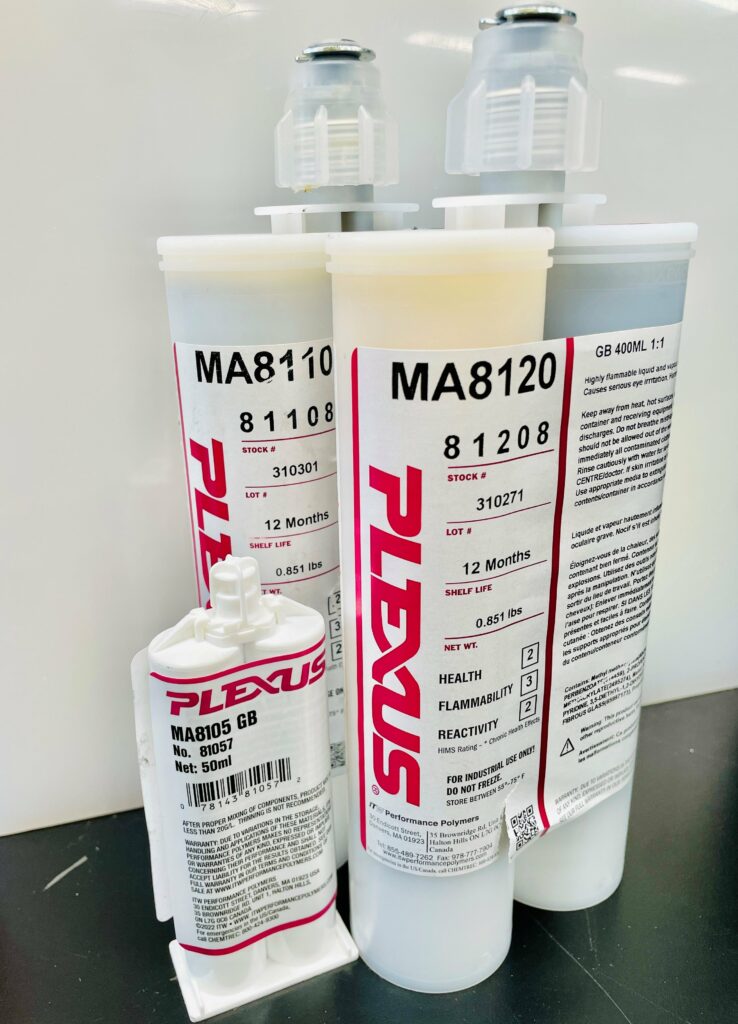Introduction
High-strength bonding with structural adhesives has become an important tool in various industries. The properly chosen adhesive system and technology allows you to effectively join dissimilar materials, distribute stress uniformly, and enhance structural integrity. Titanium, known for its high strength, low density, and excellent corrosion resistance, is increasingly used in the automotive, marine, and electric vehicle (EV) battery industries. This article explores the application of acrylic adhesives in the structural bonding of titanium (titanium bonding adhesives) within these markets.
Automotive Industry
In the automotive industry, the demand for lightweight and durable materials has led to the increased use of titanium. Adhesive bonding, particularly with acrylic (methyl methacrylate based) adhesives like the Plexus MA8000 series and Plexus MA420, offers several advantages over traditional mechanical fastening and welding methods. These industrial adhesives provide strong bonds, resist environmental degradation, and allow for the joining of different materials without compromising their integrity[1].

Structural bonding with acrylic adhesives is particularly beneficial in automotive applications where weight reduction and crash performance are critical. For instance, acrylic adhesives are used to bond titanium components in car bodies, enhancing stiffness and crashworthiness, while reducing overall vehicle weight[1]. This method of bonding lightweight materials also increases an engineer’s design freedom by enabling the integration of mixed-material designs. Although metal-to-metal bonding is still highly desirable in this field, it is becoming increasingly common in this market to combine high performance metals such a titanium with other metals and composites to achieve optimal performance and efficiency. Similar technologies are happening in aerospace leading to experts searching to test acrylics adhesives as effective aerospace adhesive solutions.
Marine Industry
The marine environment poses unique challenges, especially with the constant threat of metal corrosion. Titanium’s corrosion resistance makes it an ideal material for marine applications, and adhesive bonding with acrylic adhesives further enhances its utility. Acrylic adhesives are known for their excellent resistance to water and chemicals, making them highly desirable for bonding titanium in marine structures[2].
In the marine industry, acrylate adhesives have been used for several decades in the construction of small recreational boats, high-performance racing boats, luxury yachts, and offshore structures. These adhesives provide durable bonds that have proven to withstand the harsh marine environment, ensuring long-term structural integrity[2]. For example, in high-performance racing yachts, acrylate adhesives bond titanium components to composite materials, resulting in lightweight and robust structures that can endure extreme conditions[2].
Electric Vehicle Battery Industry
The rapid growth of the electric vehicle market has driven rapidly developed innovations in battery technology, where adhesive bonding is playing a vital role. Titanium is used in EV battery packs for its strength and lightweight properties, and acrylic adhesives are employed to bond various components, enhancing the overall performance and safety of the battery systems[3].
Acrylic adhesives in EV batteries provide several benefits, including improved thermal management, structural integrity, and vibration resistance[3]. These structural adhesive solutions bond titanium to other materials within the battery pack, such as cooling plates and module housings, ensuring efficient heat dissipation and maintaining the structural stability of the battery[4]. Additionally, the use of acrylic adhesives help in reducing the weight of the battery pack, contributing to the overall efficiency and range of electric vehicles[3].
Advantages of Acrylic Adhesives
Acrylic adhesives offer several advantages in structural bonding applications across these industries. They provide high peel and shear strength, fast curing times, and excellent resistance to environmental factors[5]. These properties make them ideal for bonding titanium, which requires strong and durable joints to maintain its structural integrity.
Moreover, acrylic adhesives are versatile and can bond a wide range of substrates, including metals, plastics, and composites[5]. This versatility allows for innovative design solutions, enabling manufacturers to optimize material usage and improve the performance of their products. The ability to bond dissimilar materials also reduces the need for mechanical fasteners, leading to lighter and more efficient structures[6]. Benefits you don’t necessarily find with titanium epoxy.
Conclusion
Adhesive bonding with acrylic adhesives is revolutionizing the use of titanium in the automotive, marine, and electric vehicle battery industries. By providing strong, durable, and lightweight bonds, acrylate adhesives enhance the performance and efficiency of titanium components in these sectors. As technology advances, the role of adhesive bonding in these industries is also growing, offering new possibilities for innovative and sustainable design solutions.
[1]: European Aluminium. “Adhesive bonding in the automotive industry.” [2]: SpringerLink. “Marine Industry – Handbook of Adhesion Technology.” [3]: Battery Tech Online. “Adhesives Technology for EV Batteries.” [4]: Battery Tech Online. “Adhesive Technology in EV Batteries.” [5]: 3M United States. “Acrylic Adhesives for Structural Bonding Applications.” [6]: 3M. “Acrylic Structural Adhesives Features and Recent Advancements.”
References
[1] EAA Aluminium Automotive Manual – Joining – European Aluminium
[2] Marine Industry – SpringerLink
[3] Adhesives Technology for EV Batteries – Battery Tech Online
[4] Adhesive Technology in EV Batteries – Battery Tech Online
[5] Acrylic Adhesives for Structural Bonding Applications | 3M United States
[6] Acrylic Structural Adhesives
By: Kry Wesselink, Product Manager EMEA and Elisabeth Baumann, Technical Service Lab Supervisor
View all our Technical Data Sheets and Safety Data Sheets. Need some help? Ask a technical question and find a solution!
Further reading: Thixotropy, Viscosity and Rheology … Oh my!, What is fixture time anyway?, and Is it strong enough?.
For more information like this, follow ITW Performance Polymers on LinkedIn and sign up for enewsletter in our website footer.
ITW Performance Polymers is an international leader in structural adhesives, grouting and chocking compounds, and wear-resistant coatings and repair products. Contact us to learn more about these products and their applications.

